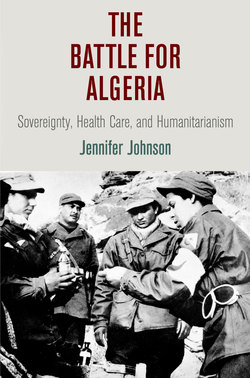Читать книгу The Battle for Algeria - Jennifer Johnson - Страница 9
На сайте Литреса книга снята с продажи.
ОглавлениеNote on Sources, Names, and Spellings
This study uses a diverse set of sources in Arabic, French, and English drawn from Algeria, France, Switzerland, and the United States.
I am among the first group of scholars to work on the Provisional Government of the Algerian Republic (Gouvernement Provisoire de la République Algérienne, GPRA) documents and those of the Algerian Red Crescent in the Algerian National Archives. My sources, which include correspondence between the Algerian political leadership in Algeria and abroad, internal strategy memorandums, medical reports, and personal letters, contribute to a more comprehensive understanding of nationalist policy during the war from the Algerian participants themselves. The cataloging system for these collections changed between 2007 and 2012. When I conducted my research in 2007 and 2008, the GPRA collection was arranged by box and file number and was separate from the Algerian Red Crescent collection. When I returned in 2012, the two collections had been combined into one GPRA collection and the numbering system had changed. The book uses the two notation systems and provides as much detail as possible about the document in the hopes that scholars will be able to find them. I used a variety of French archives in Paris and Aix-en-Provence. The IH series is the most important fonds at the French military archives in Vincennes (Service Historique de l’Armée de Terre, SHAT) for the Algerian war. At the Archives Nationales d’Outre-Mer (ANOM; formerly Centre des Archives d’Outre-Mer, or CAOM) I used 81F (Ministère chargés d’affaires algérienne), the Sections Administratives Spécialisées (SAS), and the Gouvernement Générale (GGA) files. These sources include recently declassified French government materials, such as police reports, Special Administrative Sections program documents, and French military medical unit reports that contextualize and explain the colonial position. A considerable amount of archival material that deals with the Algerian war still requires a dérogation.
The International Committee of the Red Cross (ICRC) in Geneva, Switzerland, released records on the Algerian war in 2004. I relied on these records (subfonds A AG, 1951–1965) to help supplement gaps in the Algerian and French archives. They offer a unique perspective about the process of negotiation that international organizations engaged in during decolonization. Moreover, they show internal differences among personnel about how the Red Cross should respond to the many complexities the Algerian war presented.
I consulted the United Nations Office at Geneva (UNOG) archives in Switzerland. SO 215/1 ALG and SO 215/1 France reveal extensive complaints about human rights violations committed by both sides. The UN records indicate that its members confronted these allegations beginning in 1956 into the postindependence period. These complaints complicate French and Algerian health care and medical initiatives that presented a strictly humanitarian face. I consulted the United Nations Archives and Records Management Section (UN ARMS) in New York. Three series, S-0188-0005, S-0442-0189, and S-0884-0001, were especially important in explaining how Arab, African, and Asian allies campaigned on Algeria’s behalf at the UN. Furthermore, I read published United Nations General Assembly and Security Council minutes. These records provide accounts of the vivid and passionate debates on the Algerian question that took place at the UN. They highlight multiple perspectives on the issue. I concentrate on those from previously colonized countries.
I examined the records of the U.S. Department of State (RG 59) at the National Archives and Records Administration (NARA) in College Park, Maryland, and the Foreign Relations of the United States series. These documents elucidate the American position on Algeria during decolonization.
In addition to the archival material, I rely on a small number of oral interviews with Algerian medical personnel and former war participants that I conducted over a three-year period. They provide critical insight into the history of medical services under French rule and during the war. When it was possible, I corroborated their recollections with other written sources.
My research uses newspapers, museum exhibits, published pamphlets, and photographs in French, Arabic, and English. Unless otherwise noted, all translations are my own.
In November 2012, the International Journal of Middle East Studies (IJMES) published a special issue on the Maghrib. In the foreword of the issue, the editors explained how the Maghrib, and especially Algeria, posed a transliteration problem. Even though France colonized Morocco, Algeria, and Tunisia, as well as parts of the Middle East, archival material varies across the region. French records on Algeria use the French spelling of names and places. For example, most French documents use “Mohammed,” instead of the IJMES transliteration of the same name (“Muhammad”). Moreover, Algeria was under French rule for 130 years, frequently resulting in Algerians adopting French spellings of names and places. For instance, Hussein Lahouel, an FLN representative who toured Asia in the spring of 1956 and solicited financial and political support for the nationalist effort, signed his name “Hussein.” “Husayn” is an alternate spelling that conforms to IJMES transliteration regulations. Throughout the book, I use the spelling of Algerian names published in Achour Cheurfi’s Dictionnaire de la révolution algérienne. In Lahouel’s case, I use “Hocine” to spell his first name. The same applies for Hocine Aït Ahmed, GPRA minister of state. I use the commonly accepted form of Egyptian president Gamal Abdel Nasser, as opposed to “Jamal ‘abd al-Nasir” or “Nassar.”
